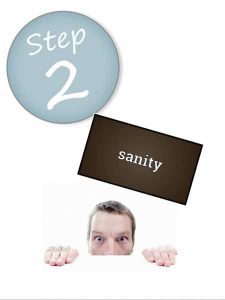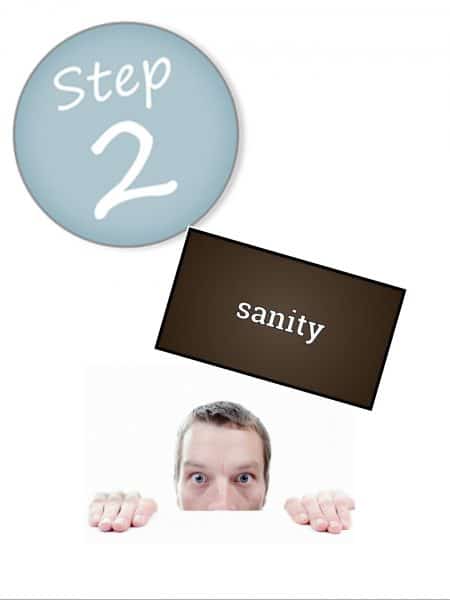 In my previous posting to this site, I discussed the importance of Step 1 and ways in which it can be worked. In this post I will discuss Step 2 in similar fashion. Step 2 reads as follows:
In my previous posting to this site, I discussed the importance of Step 1 and ways in which it can be worked. In this post I will discuss Step 2 in similar fashion. Step 2 reads as follows:
Came to believe that a power greater than ourselves could restore us to sanity.
Thoroughly working Step 2 is vital to recovery, because it prepares us for the longer-term solution to come. In other words, it introduces us to the idea that, as addicts, we are going to have to accept outside assistance and guidance if we want to establish and maintain sobriety. We’ve tried it on our own and we couldn’t stay sober, so now we’re going to have to rely on something greater than ourselves.
One common problem that many recovering addicts have with Step 2 centers on the step’s last four words, “restore us to sanity,” mostly because this phrase implies rather strongly that we are insane, and most of us think that we are not. And we will argue that point rather vociferously, voicing all sorts of explanations, excuses, and rationalizations that justify (in our own minds) our problematic behaviors. The technical term for this is denial, and you’ve probably heard about this in therapy and/or your 12 step recovery program.
Addicts who struggle with the “restore us to sanity” portion of Step 2 should ask themselves the following: “If another person was engaging in the same problematic behaviors as me, what would I think about that person? Would I think that he or she had gone off the deep end?” Usually, if we answer this question honestly, we realize that if someone else was engaging in behaviors similar to our own, we would think that other person was at least a little bit crazy. Then, based on that, we can start to view ourselves in the same light.
Addicts who still struggle with Step 2’s “restore us to sanity” language might want to consider the addict’s definition of insanity: Insanity is doing the same things over and over but expecting different results. Then they can ask themselves, “Does that sound like me? Do I stop by the bar for a cocktail—only one, of course—after work every night even though I can’t remember the last time I managed to go home after just one drink?”
Whatever the nature of our addiction—alcohol, drugs, sex, porn, gambling, gaming, or whatever—the addict’s definition of insanity has a familiar ring for most of us.
Once we have accepted that addiction has made us a little bit nuts, we can talk about the middle portion of Step 2, the “power greater than ourselves.” Many addicts immediately connect this concept with the God and organized religion of their childhood. And for some addicts this may in fact be a helpful part of a power greater than themselves. For others, however, this phrase might refer to therapy, twelve step fellowships, and support from loved ones. There is no right or wrong way to define “power greater than ourselves,” and how we choose to think about this probably depends as much on our personal belief system as anything else. So if an addict wants to include his or her God/religion/formalized concept of spirituality in the definition of “power greater than ourselves,” great. If not, the addict can think about twelve step groups and others who support his or her recovery as that power.
Now, of course, we need to ask ourselves if we believe that something outside of ourselves (however that is defined) can restore us to sanity (i.e., put our addiction and related problematic behaviors into remission). If the answer is yes, then Step 2 is in the bag. If not, we should take a good long look at our fellows in recovery. In so doing, we will almost certainly see at least a few people who are no longer active in their addiction, no longer behaving in problematic ways, and no longer experiencing serious life consequences as a result. And almost all of those recovering individuals, if asked, will say that they did not establish or maintain their sobriety on their own. Instead, they trusted the help of others.
To make sure we’ve thoroughly worked Step 2, we ask ourselves the following three questions:
- Do I believe that my life was out of control thanks to my addiction?
- Did I repeatedly try and fail to quit on my own?
- Do I believe that a power outside of and greater than myself (however I choose to define that) can help me to recover?
If the honest answer to these three questions is yes, we have worked Step 2, and it is time to move on to Step 3—a topic I will cover in detail in my next posting to this site.
Caveat
The process suggested above is not the only way to work Step 2. In truth, there are as many ways to work Step 2 as there are recovering addicts. So rather than telling you that the process I’ve suggested is the way to work this step, I will simply restate the advice I’ve heard over and over in 12 step meetings: Take what you like and leave the rest. If my suggestions make sense to you, then use them. If not, that does not mean the 12 steps are flawed; it simply means you need to work them in a different way.
In truth, the way you work the steps is not important. What’s important is that you do work them. Ongoing step work is a proven route to lasting sobriety. So please go to meetings, please get a sponsor, please build a support group, and please talk with your fellow recovering addicts about their experience working the steps. Each and every one of these people will have something useful to offer, and before you know it you’ll be helping them, too. You will become as important to these folks and their recovery as they are to you and yours.
In future postings to this site, I will present suggestions for how to effectively work Steps 3 through 12. For other general information about healing from addiction, check out my website. For treatment referrals, click here, here, or here.







5 Comments
I really liked that the reading of your blog is easy to follow and you make it simple. Thank you for helping me stay sober. I really enjoy reading ! Please keep them coming.
Loretta
Thank you. Those are very kind (and encouraging) words.
Reblogged on Magnolia New Beginnings!
Awesome, thank you!
Great post. I will use this with my sponsees, and in my own recovery as well. Looking forward to the rest of this series.